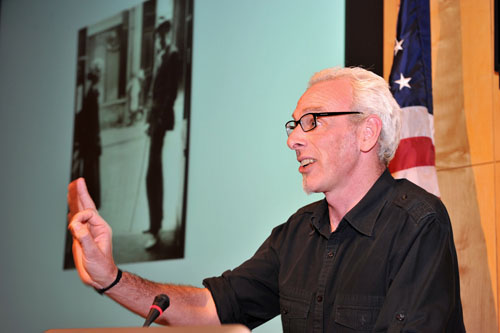A Century On, Professor's Novel Echoes Joyce
April 2010

Rodney Sharkey, PhD, explains uncanny similarities between his and
James Joyce's lives.
In its fourth year, the April Literary Lecture Series at WCMC-Q has become an anticipated feature of spring in Doha. Traditionally, the university’s writing professors have illuminated works by foremost authors, presenting them creatively with context that only an expert can provide. This year’s series is built on a twist in that they’ll expertly present their own work.
Rodney Sharkey, PhD, kicked off the month with a profound examination of his novel, Aeneas, which draws its inspiration and structure from two of the most famous works of all time—The Odyssey by Homer and Ulysses by James Joyce.
A seasoned scholar of Irish literature, Sharkey was seemingly destined to follow the lead of Joyce in particular. Although a generation apart, they lived eerily parallel lives.
“We were born in the same part of Dublin and lived in the same parts of Dublin twice over,” Sharkey said. “We went to the same two schools, to the same university and then wound up getting out of Ireland for the same reasons. And that produces certain problems when it comes to fancying yourself as a creative writer.”
Sharkey explored the idea of authors imitating one another—whereas Samuel Beckett made it his mission to go in the opposite direction to James Joyce, Sharkey said he wasn’t convinced imitation was a bad thing.
Ulysses, Joyce’s most famous work, is structurally based on Homer’s classical work, The Odyssey, written 2,700 years before Joyce’s time. Sharkey explained Joyce’s reason for using Homer’s framework—a work of more than 250,000 words based within a single day, the 16th of June, 1904.
“Joyce felt that this particular structure was ideal for his purpose because he could elevate the ordinary to the mythic by reducing the mythic to the ordinary,” Sharkey said. “Joyce said ‘I always write about Dublin but if I can get to the heart of Dublin I can get to the heart of all of the cities of the world—in the particular is contained the universal.’ So he was confident enough in his abilities that he could write about the universal and in the end he could reach all men.”
A century after the events of Ulysses, on the 16th of June, 2004, a centenary James Joyce conference took place in Dublin—Sharkey chose this date upon which to base his novel, using events of that day and the structure of Ulysses. In contrast to Beckett, an author he deeply respects, Sharkey decided: “The moment of originality is in the repetition. If Joyce borrowed Homer, then I’ll borrow Joyce.”
Sharkey read the opening two chapters from his work in progress, bringing bursts of laughter from a rapt audience as his prose conjured characters who bickered playfully and pointed out absurd coincidences in a display of obsessive thought. All of this commotion Sharkey set against the backdrop of heavy events in Cyprus and Dublin in 2004—a referendum in Ireland on the question of citizenship for children of immigrants who had been living there for five years, answered with a no; and a plan in Cyprus on what briefly further divided the Turks and Greeks, who voted in opposition to one another.
“Ireland, sons and daughters of our settlers,” Sharkey read from his book, quoting his character, Francis, “we went all over but let no one come upon us, we have suffered but let us not recognize the suffering of others. We are the intimate knowledge of suffering, great, tribal suffering, of homelessness of statelessness.”
Sharkey said that like Joyce, he often attempted to reduce giant concepts into subtle notions such as the body language of a character or the movement of light in a room.
“The barman is described constantly in terms that draw him in two different directions—so that he’s in the present, moving into the future and perhaps drawn into the past,” Sharkey explained. “Thrusting his neck into the future and the shoulders protruding into the past, so within this chapter are those games that Joyce liked to play.”
Sharkey gave the audience a final sense of his deep understanding of Joyce’s work as he drew a last parallel between a famous line in Ulysses—“on his wide shoulders through the checker-work of leaves, the sun flung spangles, dancing coins”—and his own description of the experience of a bar man in Dublin. The character he explained, was focused on money and was oblivious to national identity struggles and the larger happenings of the world:
“On his young shoulders, through the clean, smokeless air, the sun glared grimly and was dually absorbed by his black shirt. Progress,” Sharkey quoted from his novel.
He then ended his lecture: “And I’m arguing that history is progress and there will be the possibility of change, because Stephen Dedalus, the Joyce character, is always wrestling with the idea that he needs to escape history.”
Report by Emily Alp
